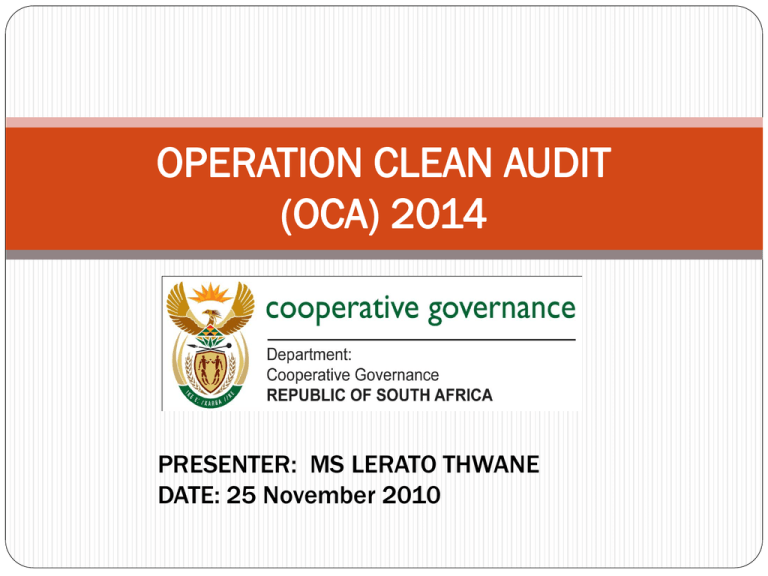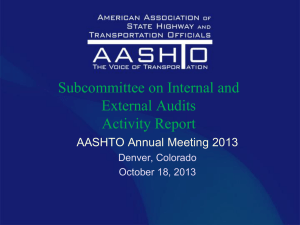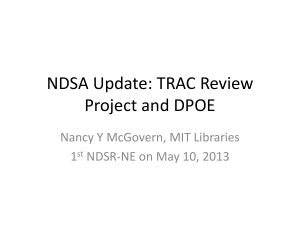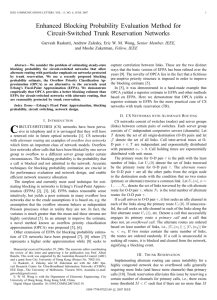Operation Clean Audit Presentation - MFMA
advertisement

OPERATION CLEAN AUDIT (OCA) 2014 PRESENTER: MS LERATO THWANE DATE: 25 November 2010 Operation Clean Audit By 2014, all 283 municipalities and 9 provinces’ departments in South Africa will have achieved clean audits on their Annual Financial Statements and maintaining systems for sustaining quality financial statements and management information. 2 OVERVIEW Background on Operation Clean Audit (OPCA) OPCA 2014 targets and progress to date Effect of asset management on OPCA targets Asset management challenges experienced by municipalities OPCA support initiatives Key issues for Accounting officer’s attention 3 Background Operation Clean Audit Operation Clean Audit forms key part of Outcome 9 of Government’s priorities: RESPONSIVE, ACCOUNTABLE, EFFECTIVE & EFFICIENT LOCAL GOVERNMENT SYSTEM 4 The approach of Outcome 9 Delivery Focus • • • • Outcomes Based Approach Hands on Political Leadership Focus on underlying root causes Stronger Intergovernmental management & coordination 5 Operation Clean Audit Targets for Municipalities & entities Financial Year % Disclaimers + Adverse opinions % Qualified opinions % Unqualified Opinions 2007-08 (Actual) 38% 21% 39% 2008-09 (Actual) 31% 17% 51% 2014 Targets Zero by 2011 60% by 2012; 75% by 2013 100% by 2014 2010 Expectation Minimum 15% 60%+ 6 Effect of Asset Management on OPCA Targets Of the total number of municipalities that were qualified in 2008-09, 110 (81%) municipalities were qualified in the area of property, plant and equipment [2007-08: 164 (89%)] Qualifications are the result of inadequate information furnished for audit purposes in order to verify the existence, completeness and valuation of property, plant and equipment. Action plans to address prior year audit findings were not adequately implemented by the finance units or monitored by the leadership, which resulted in the incorrect application of GRAP 17 in respect of Property, plant and equipment. 7 The main challenges summarised Deficiencies in the control environment and control activities. Asset systems are not always adequate. The complexity of measuring assets requires a high degree of expertise. Inadequate supervision by accounting officers and management throughout the year. Inadequate monitoring of action plans to address audit findings by leadership 8 Asset management issues during the current 2010 audit Capitalisation & reporting on library books Infrastructure verification & Componentisation Intangible assets identification Water reticulation assets where Locals have signed SLA’s with District municipalities 9 OPCA’s 3 main areas of focus Adequate leadership involvement and oversight Effective Governance arrangements • Setting the tone at the top • Ensure proper risk management • Capacitate Councilors to strengthen Oversight • Adequate internal controls • Internal audit and Audit Committees Conducive Financial management environment • Appropriate resources & appropriately qualified personnel • Adequate financial management systems • Adequate systems for dealing with audit queries 10 OPCA initiatives to support leadership involvement and effective oversight... Municipal Public Accounts Committee’s (MPAC’S) o o o o Support to Municipalities in establishment Publish the MPAC framework Launch MPAC’s nationally Partnership with APAC on training & functionality Training of Councilors (SALGA partnership) o Councilor induction training o Ongoing Councilor training 11 OPCA initiatives to support leadership involvement and effective oversight Leadership feedback system on OPCA o OPCA programme of action approved o Approval of OPCA plans by Provincial EXCO’s (Cabinets) o Quarterly progress reports on OPCA to Provincial EXCO, Premier Coordinating Forum o Consolidated quarterly progress reports to MINMEC Training of Councilors (SALGA partnership) o Councilor induction training o Ongoing Councilor training 12 OPCA initiatives to support effective governance arrangements Internal Audits: o Provincial Treasuries’ internal audit units and audit committee upskilling by the Institute of Internal Auditors o SAICA partnership project expanded to include support to the functionality of internal audit units o PCC’s to monitor and report quarterly on functionality Audit Committees: o Partnership with the Institute of Directors (IoDSA) for training of committee members & continuous guidance through membership. o PCC’s to monitor and report quarterly on functionality o Governance monitoring tool to be provided by IoDSA 13 Initiatives to support systems to address previous audit findings Provincial coordinating committees This is a forum with representation by all key role-players i.e. SALGA, Auditor General (advisory), National Treasury, Provincial Treasury, Provincial COGTA, Office of the Premier, SALGA and DBSA. Purpose: A coordinated approach to financial management support programs whilst maximizing resources and eliminating duplication, A single strategy for the province translated into provincial action plans, Direct the focus towards achievement of OPCA objectives, Visibility & Support to the municipalities, Accountability and constant reporting on progress 14 Initiatives to support conducive financial management arrangements Financial IT system standardisation in Local Government o 2011 project to define the ideal system for local government & o Investigate the standardisation of systems Skills development projects o Current AAT training for lower level financial managers o ACCA partnership on skills development o Long term strategy for training Chartered Accountants for Local Government (SAICA partnership) o Ongoing training by all stakeholders (Provinces, National Treasury, etc) 15 Key issues requiring the Accounting Officers’ and CFOs’ attention: 1. Leadership issues Tone at the top towards financial management and accounting issues Guidance, monitoring and supervision Commitment to implement corrective actions Maintaining required level of staffing numbers and skills 2. Financial management issues Preparation of complete set of financial statements on a monthly basis Basic internal controls implemented including reconciliations Commitment to corrective measures on AG quarterly key controls report Document management and safeguarding of documents 16 Key issues requiring the Accounting Officers and CFO’s attention: 3. Governance issues Ensure that Internal Audit assists leadership in providing independent assurance on the implementation of the action plans on audit issues Ensure that Audit Committees fulfil the responsibility for reviewing the financial statements submitted for audit Support the establishment and functionality of MPAC’s 4. Support issues PCC’s are there to co-ordinate municipal support, ensure that your support requirements are met. Ensure honest & accurate reporting to facilitate adequate support 17 THANK YOU 18









